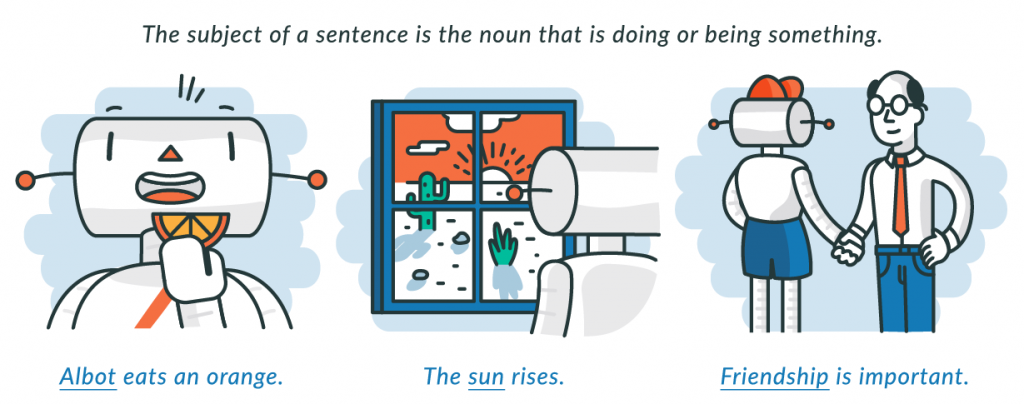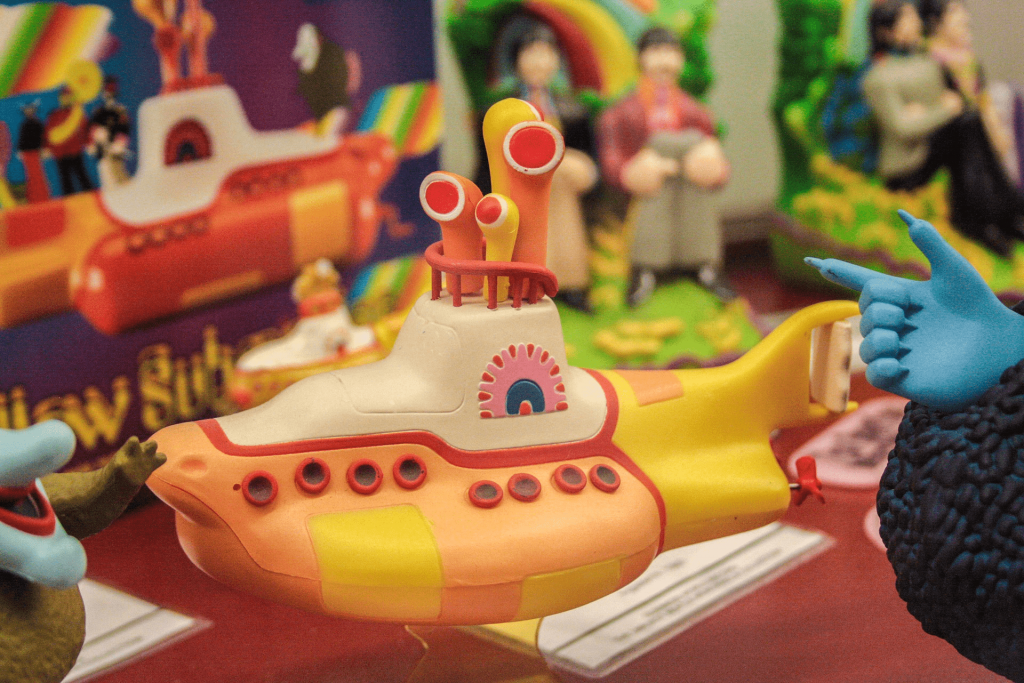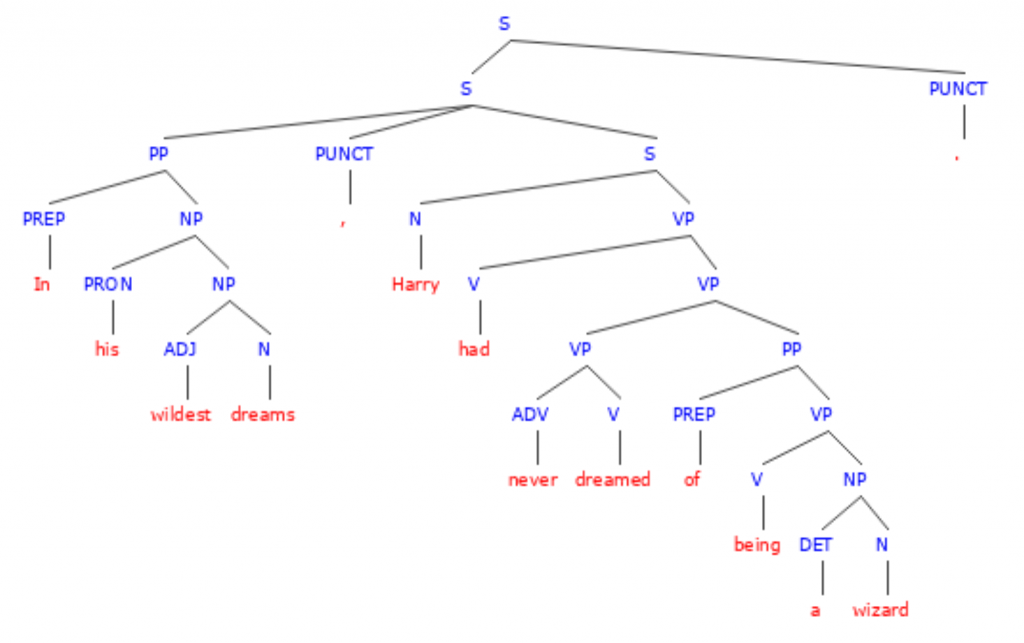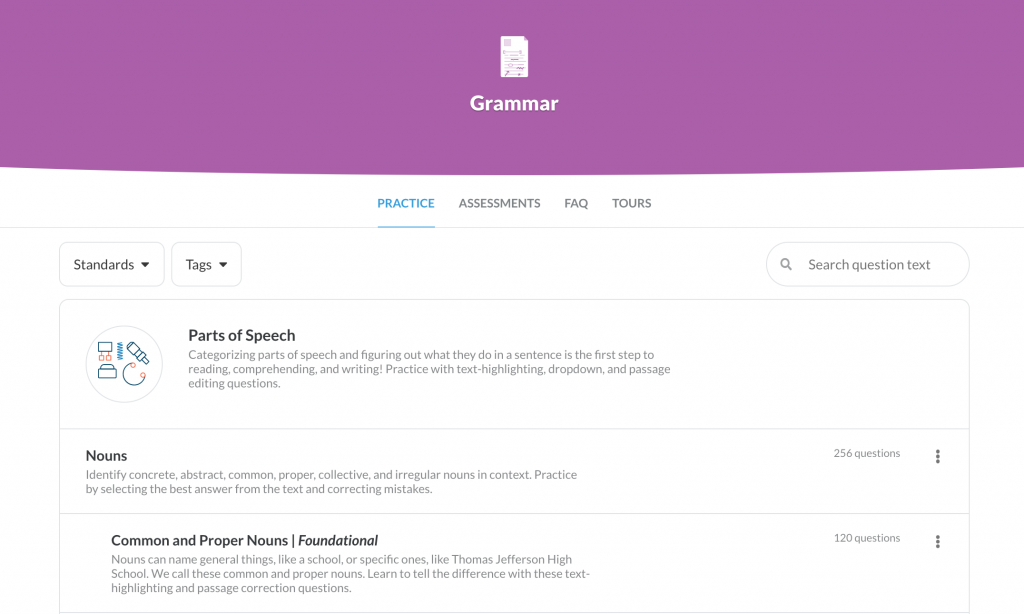1. What is the Subject of a Sentence?
A subject is the person, place, idea, or thing that a sentence is about. It’s the noun that is “doing” something in the sentence. Every sentence needs at least one to function properly—otherwise, the sentence wouldn’t be about anything! So, they are absolutely crucial to writing and speaking in English. In fact, subjects might be the most important parts of sentences.
To find a sentence’s subject, usually all you have to ask is: what is this sentence about? Many sentences have only one subject, but they can also have two or more. Sometimes the subject is only one word, called a simple subject; sometimes subjects share a verb and become a compound subject; or sometimes they include other descriptive words, called a complete subject.
2. Examples of Subjects
Every sentence has at least one subject, and it can be almost anything. Because they are the focus, subjects usually come at the beginning of a sentence; many times they are the first word or words. The subjects are underlined in the examples below:
- I really love the county fair. “I” as subject
- He doesn’t like popcorn. “He” as subject
- The dog loves popcorn. “the dog” as subject
- Sally and Sam went to the fair together. “Sally” and “Sam” as subjects
- County fairs always have popcorn stands. “County fairs” as subject
- Dogs love popcorn, but cats like soda. “dogs” and “cats” as subjects
3. Parts of Subjects
Sometimes a subject is only one word, but sometimes it includes modifiers, or can be a noun phrase or gerund. Let’s start with this sentence:
The dog ate the popcorn. Subject = “dog”
- Modifiers
A modifier is an adjective or adverb that “modifies” other words in a sentence to make it more descriptive. A subject with a modifier gives you a clearer idea of the noun that the sentence is about. Here’s an example:
The fat dog ate the popcorn. Subject = “fat dog”
This sentence includes the modifier “fat” to better describe the dog.
a. Noun Phrases
A phrase is a group of two or more words that work together but don’t form a clause; and a noun phrase has a noun or pronoun as the main word, and acts like a noun in a sentence. Since it acts like a noun, a noun phrase can be the subject of a sentence, like this:
The fat dog with brown fur ate all the popcorn. Subject = “the fat dog with brown fur”
So, this sentence is about “the fat dog with brown fur,” not just any dog. Here, the phrase “the fat dog with brown fur” works like a noun. You could easily replace this phrase with only “the dog,” but using a phrase better describes the dog and the situation.
b. Gerunds
A gerund is a word that ends in “ing” but functions as a noun in a sentence, NOT as a verb. Because gerund and gerund phrases work like nouns, they can also be subjects, like this:
Eating is my dog’s favorite hobby. Subject = gerund “eating”
Eating popcorn is my dog’s favorite hobby. Subject = gerund phrase “eating popcorn”
Remember, a gerund works like a noun, not a verb!
3. Types of Subjects
Sometimes the subject of a sentence can’t be as simple as one word, so we need different types in order to be able to say what we mean. There are three main types of subjects: simple, compound, and complete.
a. Simple Subject
A simple subject is the main word that tells what a sentence is about. It does not include modifiers or other words. Here are some examples:
- Sally went to the county fair. Person as subject
- The fair was famous for its popcorn. Place as subject
- The hot popcorn was buttery. Thing as subject
A sentence can have more than one simple subject, if they have their own verbs (green):
- Sally went to the county fair, and Sam drove to the market. Subjects “Sally” and “Sam”
- The dog ate popcorn, and the cat drank Subjects “dog” and “cat”
- The popcorn smelled buttery, and the soda tasted Subjects “popcorn” and “soda”
As you can see, each of the subjects has their own verb. For instance, the first sentence has the simple subjects “Sally” and “Sam,” but Sally “went” and Sam “drove.” So, while they are both subjects, they are each doing their own thing.
If two or more subjects use the same verb, then the sentence has a compound subject.
b. Compound Subject
When two or more subjects in a sentence share the same verb, it makes a compound subject:
- Sally and Sam went to the county fair.
- The dog and the cat ate popcorn.
- The popcorn and the soda are delicious.
For a compound subject to occur, the subjects MUST share the same verb. In the first sentence above, both Sally and Sam do the same thing: they “went” to the county fair. Since they both did the same thing, they can share one verb. Without a compound subject, the sentence would look like this:
Sally went to the county fair, and Sam went to the county fair.
You can see that this sentence is unnecessarily long. We don’t need to say these two things separately, which is why we have compound subjects.
c. Complete Subject
A complete subject is made up of all of the words that tell what a sentence is about, including modifiers:
- The fat dog with brown fur ate all of the popcorn.
- The big dog and the small cat went to the county fair.
- Silly Sally and her best friend Sam drove to the fair.
All of these sentences include modifiers that add to the subject. Let’s look more closely at the third sentence:
Silly Sally and her best friend Sam drove to the fair.
Here, the simple subjects are Sally and Sam. But, the sentence also includes the modifier “silly” to describe Sally, and the noun phrase “her best friend Sam” to describe her friend. So, the complete subject of the sentence includes all of the words that make up the subject. If we ask the question “what is this sentence about?”, our answer is the two subjects “Silly Sally and her best friend Sam.”
4. How to Avoid Mistakes with Subjects
As you now know, the subject is the main thing a sentence is about, and all sentences need one. But, what’s more, all subjects need a verb to show an action that is being done. So remember, a subject is nothing without its verb, and a sentence doesn’t exist without its subject!
Furthermore, you want to be sure not to mistake an object or prepositional phrase for a subject.
a. Objects
It’s important to be able to distinguish between the subject and an object in a sentence. Sometimes it can be confusing, so remember this rule: a subject “does” the verb, and an object “gets” the action of the verb. Let’s look at this sentence:
The dog is cooking popcorn for the cat.
This sentence has only one subject: the dog. That’s because the dog “does” the action “cooking.” The cat is NOT a subject—it is an object, because it “gets” the popcorn. Let’s try another:
The dog danced for the rabbit, and the cat slept.
Here, there are two subjects, the dog and the cat, and one object, rabbit. The dog does the dancing, the rabbit gets to see the dancing, and the cat does the sleeping.
b. Prepositional Phrases
A preposition is a word that indicates location, like in, at, with, on, beside, before, after, to name a few. Prepositional phrases combine a preposition with a noun. Like subjects, they often come at the beginning of the sentence, but, they are NOT the subject—they only give details.
Here are some examples:
The dog went to the county fair. Subject = dog
Last night, the dog went to the county fair. Subject = dog
The dog cooked popcorn. Subject = dog
At home, the dog cooked popcorn. Subject = dog
Adding a prepositional phrase does not affect a sentence’s subject. The prepositional phrases just add details about the subject itself, they do NOT work like nouns, and can’t be the sentence’s subject. An easy trick to remember is that the prepositional phrase can usually be switched to the end of the sentence:
The dog went to the county fair last night.
BUT, you couldn’t do the same thing with a subject, like this:
Went to the county fair the dog. Incorrect!
Now, let’s review!
- To find a sentence’s subject, you just need to ask: what is this sentence about?
- The main word that tells what a sentence is about is the simple subject.
- When more than one subject share the same verb, you have a compound subject.
- A subject together with all of its modifiers is the complete subject.
What is the definition of subject? The subject of a sentence is the person, place, thing, or idea that is performing the action.
On the most basic level, a sentence contains two parts: a subject and a predicate. The subject includes the noun that is performing the action described in the predicate.
Examples of Sentence Subjects
Let’s look at some examples of sentences in English sentences.
- Janet washed the car.
- Janet = subject
- Washed = action performed
- Chris worked from sunrise to sunset.
- Chris = subject
- Worked = action performed.
Simple Subject, Complete Subject, Compound Subject
Simple subjects refer to just the noun that is performing the action and no other words that are describing that noun:
- The blue-eyed girl played on the jungle gym.
- Girl = simple subject that performs the action = played
Complete subjects include the noun that is performing the action and any descriptors of that noun:
- The hairy, three-eyed monster scared the young boy.
- The hairy, three-eyed monster = complete subject that performs the action = scared
Compound subjects are ones in which two nouns perform the action:
- Chris and Janet love to read comic books.
- Chris, Janet = compound subject that perform the action = read
Subjects Are Not Part of a Prepositional Phrase
One thing to be careful with is to not include any prepositional phrases with your subject. These phrases are used to provide extra information and are not part of the subject of the sentence.
- The tree in the park was very tall.
- Tree = subject
- Was very tall = predicate
- In the park = prepositional phrase
Subject in Different Sentences
Here are some examples of subjects being used in various ways.
The subject performs an action:
- Garcia sold used cars.
- Garcia = subject
- Sold = action
The subject is described:
- Jennifer was tall and slender.
- Jennifer = subject
- Tall, slender = descriptions
The subject is identified.
- The boy who was the valedictorian applied to several universities
- Boy = subject
- Who was the valedictorian = identifier
The subject has an action done to it.
- The boy was accepted into the police academy.
- Boy = subject
- Was accepted = action done to subject by the police academy
Usual Sentence Format
The usual sentence format includes a subject, verb, and object.
- The teacher taught the students.
- Teacher = subject
- Taught = verb
- Students = object
- Jennifer dusted the blinds.
- Jennifer = subject
- Dusted = verb
- Blinds = object
Summary: What Are Subjects?
Define subject in English: The subject of a sentence is that noun that is doing or being something. It is important to identify the verb in the sentence and ask yourself what noun it is connected to.
Final example:
- Public university tuition rises every year.
- Tuition = subject
- Rises = verb
Contents
- 1 What is the Subject?
- 2 Examples of Sentence Subjects
- 3 Simple Subject, Complete Subject, Compound Subject
- 4 Subjects Are Not Part of a Prepositional Phrase
- 5 Subject in Different Sentences
- 6 Usual Sentence Format
- 7 Summary: What Are Subjects?
In grammar, the sentence is the simplest unit which can express a complete thought independently. It is written with a capital letter, an end punctuation (a period, an exclamation point, or a question mark), and most importantly, it has a subject and a predicate. In this article, one of the most important parts of a sentence will be explored—the subject.
What is the Subject and its Function?
In its simplest sense, the subject refers to the doer of the action or to what (or whom) the sentence is all about. It can either be a person, a place, a thing, or an idea, and can come in the form of a noun or a pronoun. Take a look at the examples below:
- During the exam, Tommy slept in his chair.
- In this example, the verb is “slept” and the doer of the action is the noun “Tommy,” which is why he is the subject in this sentence.
- They are extremely wealthy.
- The italicized verb in this example expresses the state of being of the pronoun “they,” which is the subject in the sentence.
- Joey and Phoebe went to the audition.
- In this sample sentence, “Joey” and “Phoebe” are both the doers of the action “went.” Therefore, both of them are the subjects in this example.
What are the Different Forms of Subjects?
Listed below are some of the most important terms related to the concept of the subject.
1. Complete Subject
The complete subject simply refers to:
Examples:
- The muscular man lifted the heavy table and transferred it to the other room.
- In this example, the doer of the italicized verbs “lifted” and “transferred” is the “man.” But if you’re asked to underline the complete subject, you must also include the descriptive words (modifiers): “the” and “muscular.” Therefore, the complete subject in this sentence is the whole underlined part.
- The tall and pretty lady fell into the freezing water.
- In this sentence, the complete subject is “the tall and pretty lady,” because “lady” is the one who did the action “fell”. Take note that the words before the word “lady” are just the modifiers or descriptive words that distinguish this lady (in the sentence) from the other ladies.
2. Simple Subject
Basically, the simple subject refers to the noun or pronoun which is being or doing something. Unlike the complete subject, this doesn’t require you to include the descriptive words (modifiers)—just the main noun or pronoun will do.
Examples:
- The mighty superhero saved the day.
- The simple subject in this sentence is the noun “superhero,” because he is the doer of the action “saved”.
- She is indeed the epitome of kindness.
- The simple subject is the pronoun “she,” because it refers to the person being talked about in this sentence.
3. Compound Subject
This term simply refers to two or more subjects in a single sentence joined together by a connector.
Examples:
- The captain and his ship were lost in the heavy storm.
- The underlined part is the compound subject consisting of the two main nouns, “captain” and “ship,” plus the connector “and.” This is considered as the compound subject because the captain and his ship were the ones who “were lost,” or simply the doers of the action word or verb.
- Christmas and New Year are my favorite holidays.
- This sample sentence is about two events namely, “Christmas” and “New Year.” Therefore, these two nouns connected by the word “and” are considered as the compound subject in this sentence.
What is the Easiest Way to Spot the Subject in the Sentence?
If you are having difficulties figuring out what is the subject in a sentence, an easy tip to remember is to identify the verb first. (Note: A verb refers to a word which expresses an action or a state of being.)
Once you have identified the verb, the next thing you should do is ask the question “what” or “who” is doing this?
For example:
- Billy jumped over the fence to escape the dog.
- Step 1- Ask “What is the verb?”
- The verb is the action word “jumped.”
- Step 2- Ask ”Who jumped?” or “What jumped?”
- Since “Billy” jumped, he is the subject in the sentence.
From the simple steps mentioned, you will be able to identify the subject without even breaking a sweat. Also, you must know that there are times when the subject is not explicitly stated or is not actually written in the sentence, such as in the examples below:
- Run!
- Please read the instructions carefully.
In sentences like those above, which state a command or a request, it is understood that the subject who does the italicized action words is “you.”
Final Thoughts
A deep understanding of the subject is very important for you to be able to form well-written compositions. This is one of the most basic and fundamental concepts in grammar, so you really have to get a good grasp on this topic before advancing to more complicated ones. With the simple explanations, examples, and tips provided in this article, studying this area shouldn’t be that hard at all.
Every sentence must have a subject and a predicate to be complete. However, both of these concepts need a little more explaining if we want to use them correctly. In this blog post we will dive into subjects, but Albert has provided another post that can help you learn more about predicates when you’re ready.
When you’re ready, test yourself with a quiz and practice with our high-quality, standards-aligned questions here.
The Basics of Subjects

What is a Subject?
The subject of the sentence is always a noun or a pronoun that is either performing the action of the sentence or experiencing a state of being.
For example:
- The frigid water in the sparkling pool shimmered in the afternoon sun.
Water is the subject of this sentence because it is doing the action of shimmering. The word pool is also a noun; however, it cannot be the subject of the sentence because it is attached to a prepositional phrase that modifies the noun. Noun objects of prepositional phrases can never be subjects.
While water by itself is considered a simple subject, the complete subject of a sentence includes the noun and all of its modifiers.
For example:
- The frigid water in the sparkling pool shimmered in the afternoon sun.
Since the article the, the adjective frigid, and the prepositional phrase in the sparkling pool all modify or give the reader more detail about the water, all of these words are considered part of the complete subject.

How are subjects different from predicates?
While the subject of a sentence describes who or what is performing an action or experiencing a state of being, the predicate of a sentence describes the action or state of being itself.
For example:
- She had always wanted to visit the mountains of New Zealand.
In this sentence, she is the subject. The verb phrase “had always wanted” as well as the infinitive phrase, “to visit”, the direct object, “the mountains”, and the prepositional phrase, “of New Zealand” are all part of the predicate.
Now, someone might say to you that it is easy to tell the subject apart from the predicate in a sentence because the subject always comes first. But, they are only partially correct!
While subjects usually appear before predicates in sentences, they are allowed to show up fashionably late and still be considered a subject.
For example, in the popular Beatles’ song, “Yellow Submarine”, the song begins with this sentence:
- “In the town where I was born lived a man who sailed to sea.”
Where is the subject? Is it town? Is it I? Or is it man? This sentence is a perfect example of why we must remember the distinct roles of both the subject and the predicate of the sentence.
If lived is the action of the sentence, man is the most logical answer for who performed this action and the correct candidate for the subject of the sentence.

How are simple subjects, complete subjects, and compound subjects different from each other?
Simple subjects consist of only one noun or pronoun that is performing an action or experiencing a state of being in a sentence.
For example:
- The Overlook Hotel is the sinister setting of Stephen King’s novel, The Shining.
Overlook Hotel is the simple subject of this sentence.
Complete subjects include the noun or pronoun that is performing an action or experiencing a state of being in a sentence in addition to all of the noun’s modifiers, such as articles, adjectives, or prepositional phrases.
For example:
- The main character in Stephen King’s novel, The Shining, loses his mind while isolated in the Overlook Hotel.
In this sentence, character is the simple subject, but when combined with a prepositional phrase, an appositive phrase, an article and an adjective, a complete subject is formed.
Compound subjects consist of two or more nouns or pronouns that are performing the same action or experiencing the same state of being in a sentence.
For example:
- Danny and Wendy hid in the labyrinth from Jack.
In this sentence, since two different nouns are performing the action of hiding, both nouns make a compound subject together.
Return to the Table of Contents
3 Tips for Understanding Subjects
Here are some important tips to help you understand Subjects:

Tip #1. The subject of a sentence can never be a direct object or an object of the preposition
For example:
- Can we buy popcorn at the movie theater today?
In this sentence, we is the subject, popcorn is the direct object, and movie theater is the object of the preposition. It would be illogical for the popcorn to buy itself or for the movie theater to buy the popcorn (even though that would be nice!).
Tip #2. A sentence can have multiple subjects–either side by side or in separate clauses
For example:
- As the volleyball soared over the net, the opposing team scrambled to return it and failed.
In this sentence, there are two nouns performing two different actions. Even though these are not compound subjects because they are performing different actions, they are each the subject of their own clause.
Tip #3. The subject of a sentence does not have to come before the predicate
For example:
- In the middle of the yard sat a big Golden Doodle puppy.
Even though this sentence begins with a prepositional phrase, yard cannot be the subject of the sentence because it is the object of a prepositional phrase. Therefore, the big Golden Doodle puppy has to be the subject of the sentence because it is performing the action of sitting.
Return to the Table of Contents
Applying the Basics: Subject Review & Practice
Now that you understand how subjects function in sentences, review the anchor chart below and complete the review to fully understand how to use and recognize subjects.
The Ultimate List of Subjects
Refer to the graphic below to learn the different types of Subjects:

This list, obviously, does not include all possible subjects; however, it is meant to be used as a guide while identifying this type of noun.
Subject Exercises and Review
Now that you know some common subjects, test your ability to find them in various sentence structures.
Select the subject(s) in the sentences below. Remember, subjects are the noun(s) or pronoun(s) that are either performing the action in the sentence or experiencing a state of being.

1. In his wildest dreams, Harry had never dreamed of being a wizard.
In this sentence, Harry is the simple subject. The prepositional phrase, “in his wildest dreams”, is not part of the subject in this sentence since it modifies when the action of dreaming was performed.
2. His face covered in soot, Hagrid arrived at Privet Drive.
In this sentence, his face covered in soot, Hagrid is the complete subject since the introductory participial phrase modifies Hagrid.
3. Ron’s spell backfired and caused him to spit up slugs.
In this sentence, Ron’s spell is the complete subject that consists of a possessive noun, Ron’s, and the simple subject, spell.
4. When Ginny opened the Chamber of Secrets, Voldemort was using her as a puppet.
In this sentence, Ginny and Voldemort are both subjects of two different clauses within the sentence. Both subjects perform their own action, so these are not considered compound subjects.
5. Both the Whomping Willow and the Forbidden Forest nearly destroyed the Weasley’s car.
In this sentence, Whomping Willow and the Forbidden Forest are both part of a compound subject since they both almost destroyed the car. Nearly is considered part of the predicate, not the subject, since it modifies the verb, destroyed.
Pro tip: The subject of a sentence always identifies who or what is performing the action or experiencing a state of being in a sentence. If you are unsure how to find the subject of a sentence, look for the main verb first, and then find the noun that pairs most logically as the subject of this verb.
For additional practice, check out our Subjects content on Albert.
Return to the Table of Contents
Try for Yourself: Subjects Quiz

Feeling confident in your understanding of subjects?
Take this short six-question quiz to see what you’ve learned:
1. Can a sentence have multiple subjects?
- Answer: Yes
- Correct Explanation: That’s right! A sentence can have several subjects as long as each subject is sharing an action or state (compound subjects) or each subject is in a separate clause.
- Incorrect Explanation: Sorry, that’s not right! Remember, a sentence can have multiple subjects as long as each subject is sharing an action or state (compound subjects) or each subject is in a separate clause.
2. Can an object of a preposition or a direct object be the subject of a sentence?
- Answer: No
- Correct Explanation: That’s right! Objects of prepositions or direct objects can never be the subject of the sentence.
- Incorrect Explanation: Sorry, that’s not right! Remember, objects of prepositions or direct objects can never be the subject of the sentence.
3. In this sentence, is the noun “Spongebob” or the noun “Squidward” the subject of the sentence?
Spongebob annoyed Squidward with his endless questioning.
- Answer: Spongebob
- Correct Explanation: That’s right! The noun Spongebob is the subject of the sentence because it is performing the action. Squidward is the direct object because this noun is receiving the action.
- Incorrect Explanation: Sorry, that’s not right! Remember, subjects perform the action of the sentence. Squidward is the direct object because this noun is receiving the action.
4. In this sentence, is the noun “Plankton” or the noun “Mr. Krabs” the subject of the sentence?
Plankton stole the Krabby Patty recipe from Mr. Krabs.
- Answer: Plankton
- Correct Explanation: That’s right! The noun Plankton is the subject of the sentence because it is performing the action. Mr. Krabs is the object of a prepositional phrase and cannot be a subject.
- Incorrect Explanation: Sorry, that’s not right! Remember, subjects perform the action of the sentence. Mr. Krabs is the object of a prepositional phrase and cannot be a subject.
5. In this sentence, is the word “ideally” or the word “task” the subject of the sentence?
Ideally, the task should be done by Monday.
- Answer: task
- Correct Explanation: That’s right! In this sentence, the word task is the subject of the sentence. Even though ideally comes first in the sentence, it is actually an adverb that modifies the entire sentence.
- Incorrect Explanation: Sorry, that’s not right! Remember, subjects perform the action of the sentence and must be nouns. Even though ideally comes first in the sentence, it is actually an adverb that modifies the entire sentence.
6. In this sentence, is the noun “search” or the noun “he” a subject in this sentence?
His search for the Holy Grail ended when he made a crucial mistake.
- Answer: Both
- Correct Explanation: That’s right! This was a trick question! Both of these nouns have their own specific actions and are in separate clauses; therefore, they are both subjects in this sentence.
- Incorrect Explanation: Sorry, that’s not right! Remember, a sentence can have multiple subjects either performing the same action (compound subject) or performing their own action in different clauses.
For additional practice with subjects, check out our practice on Albert: Subjects.
Return to the Table of Contents
Teacher’s Corner for Subjects
Subjects and predicates are the essential building blocks for creating complete sentences, but oftentimes our students have trouble finding just the subject or the main verb of a sentence. The Common Core English Language Progressive Skills Chart is a helpful tool in outlining when students should ideally master different grammatical skills, but as teachers, we know our students’ individual needs more than anyone.
For specific standards on the different types of nouns and subjects, check out the Common Core State Standards website.
Albert’s subject practice provides over 100 practice questions to help students quickly and confidently locate the subject of a sentence. Additionally, Albert also provides comprehensive assessments that can be used by educators to assess particular skills.
Summary for Subjects
Be sure to check out our grammar course for more subject practice.
You can also access over 3,400 high-quality questions that address nearly every grammatical concept.
Need help preparing for your Grammar exam?

Albert has hundreds of grammar practice questions with detailed explanations to help you master concepts.
What image comes to your mind when someone uses the word subject in a sentence? If something is the subject of a discussion, debate, talk, conversation, or sentence, it is what that activity or the sentence revolves around. In this post, we will understand what a subject is, how it looks like, and the different types of subjects in English.
A subject of a sentence is a part that the sentence revolves; it is what the sentence focuses on. In linguistics, the subject of a sentence is a person that does an action or a person/thing that about whom/which the sentence gives information about.
Examples:
1. Jacob calls me in the morning. (Focusing on the subject and what he does)
2. One of my friends called me last night. (Focusing on who called me)
3. I have invited all of them. (Focusing on the subject performing an action)
In these sentences, we are focusing on the doer of the action: subject. Now, let’s study some examples where the subject does not perform an action, where the sentence gives information about the subject by renaming it (using a name or modifying it (using an adjective).
NOTE: The subject can be at the receiving end of an action. This happens in passive voice. In passive voice, we focus on the receiver of the action, not the doer of the action.
Ex – This place has been beautifully decorated.
The person or people who have done this are not important. This sentence is in the passive voice; the subject (this place) will be the direct object in the active voice. (Subject = this place)
Ex – Monica was given a secret task to do.
Monica doesn’t do the action of giving here in the sentence; she receives it. The sentence is in the passive voice. (Subject = Monica)
1. Jacob is a dancer. (renaming the subject)
2. My sister is my best friend. (renaming the subject)
3. Jon and Monica were enemies. (renaming the subject)
4. You are talented. (modifying the subject)
5. Mangesh has been very supportive. (modifying the subject)
6. My friends were quite rich back in the day. (modifying the subject)
In the first three examples, we are giving a name to the subject using a noun or a noun equivalent.
- Jacob = a dancer.
- My sister = my best friend
- Jon and Monica = enemies
In the last three examples, we are describing the subject with an adjective.
- You = talented
- Mangesh = very supportive
- My friends = quite rich back in the day
We can also talk about the mental state, emotional state, or possessional state of the subject using stative verbs. Let’s study some examples to understand this.
1. Jon loves talking to kids. (talking about the emotional state of the subject)
2. I understand the gravity of this gravity. (talking about the cognitive state of the subject)
3. We own this house. (talking about the possessional state of the subject)
Here, the subject is not performing a dynamic action; we are just showing the state the subject is in.
Types of subjects in English
There are three types of subjects in English:
- Simple subject
- Compound subject
- Complete subject
| Types of subjects | Explanation | Examples | Subject in the example |
| Simple subject | it is a noun or pronoun without any modifiers in it. | 1. Jon is my best friend. 2. We love you. 3. Some people want to meet you. 4. The story of the movie was fascinating. |
1. Jon 2. we 3. people 4. story |
| Compound subject | it is a combination of two or more subjects (of any type) together. | 1. Jon and I live together. 2. My father and I don’t see eye to eye. 3. Jon, Conor, and Tim are not going on the trip. |
1. Jon and I 2. My father and I 3. Jon, Conor, and Tim |
| Complete subject | it is a combination of a simple subject and the modifiers that come right before or after it. | 1. My friends are waiting for me. 2. Someone from your class has been messaging me. 3. Some people want to meet you. 4. The story of the movie was fascinating. |
1. My friends 2. Someone from your class 3. Some people 4. The story of the movie |
Simple subject
A simple subject is a one-word subject. It does not include any modifiers.
Examples:
- Simran has everything she needs.
- India is the biggest democratic country in the world.
- Jacob loves pancakes.
- The man in the white coat is a doctor.
- The best dancer of this group was Ronny.
NOTE: It does not have to be a single word. It can be a group of words, but it won’t have any modifiers.
Examples:
- New Delhi is the capital of India.
- The Taj Mahal is one of the seven wonders of the world.
- Justin Bieber is my sister’s favourite singer.
Here, the subject is a proper noun. It does not have any modifiers.
Complete subject
A complete subject is a combination of a simple subject and the words that modify it.
Examples:
1. The movie was amazing.
Simple subject = movie
Modifier = the
Complete subject = the movie
2. A wise man once said that money is an illusion.
Simple subject = man
Modifiers = a, wise
Complete subject = a wise man
3. Some people just make excuses for their failures.
Simple subject = people
Modifier = some
Complete subject = some people
4. People living in this area are very poor.
Simple subject = people
Modifier = living in this area (present participle phrase)
Complete subject = people living in this area
5. The man in the blue coat teaches History here.
Simple subject = man
Modifiers = the, in the blue coat
Complete subject = the man in the blue coat
A complete subject is formed using a simple subject and one or more modifiers. Here are the ways to form a complete subject:
- Pre-modifier/s + simple subject
- Simple subject + modifier/s
- Pre-modifier/s + simple subject + post-modifier/s
Pre-modifier + simple subject
- My friends love me. (Premodifier = my)
- A school is being built here. (Premodifier = a)
- That car is more expansive than our house. (Premodifier = that)
- His performance was amazing. (Premodifier = his)
- A few people have gathered here. (Premodifier = a few)
- Three women were hit by his car. (Premodifier = three)
Simple subject + post-modifier
- People in my village support each other. (post-modifier = in my village)
- Events of such nature kept happening. (post-modifier = of such nature)
- Girls protesting outside the college are from different parts of the country. (post-modifier = outside the college)
Pre-modifier + simple subject + post-modifier
- The man looking at us looks strange. (premodifier = the, post-modifier = looking at us)
- The goal of this gathering is to raise money for some poor kids. (premodifier = the, post-modifier = of this gathering)
- The movie that we watched the other day opened my eyes in many ways. (premodifier = the, post-modifier = that we watched the other day)
Compound subject
A compound subject is a combination of two or more (generally two) simple subjects or complete subjects. It is joined by a coordinating conjunction, usually with ‘and’, ‘nor’, and ‘or’.
Examples:
- Mohit and Rohan are best friends.
- Jon and Max came to see me the other day.
- Susan or I can go there and talk to the mangement about this.
- The teachers or the management can solve this problem.
- Some green vegetables, milk, sugar, and flour are needed for this dish.
A compound subject can also be joined with correlative conjunctions such as ‘not only…but also‘, ‘Both…and‘, and ‘neither…not’.
- Neither the doctors nor the patients were happy with the ongoing protests.
- Both the police and the protestors are working together.
- Not only my parents but I am also in support of this rule.
Note: when ‘neither…nor‘ and ‘either…or‘ form a subject, the verb follows what comes after ‘nor’.
- Neither the students nor the teacher is excited about the new rules of the school.
- Either you or she is coming with me.
What can be a subject of a sentence?
The following things can act as the subject of a sentence:
- Noun/Noun phrase
- Noun clause
- Pronoun
- Gerund/Gerund phrase
- Infinitive/Infinitive phrase
NOUN
- Money can buy happiness, some say.
- Democracy is the strongest pillar of this country.
- Courage is what you need to show.
NOUN PHRASE
- My money is not your money.
- A dog bit him.
- Some of your friends don’t appreciate what you do.
Click here to master noun phrases in English.
NOUN CLAUSE
- What I want is love.
- Who called you yesterday was a friend of mine.
- Why he left that job is still a mystery to me.
PRONOUN
- I love teaching English.
- Everyone loves Ashish.
- That is a beautiful house.
GERUND
- Teaching is my passion.
- Smoking can kill you.
- Running keeps me fit.
Click here to master gerunds in English.
GERUND PHRASE
- Playing with kids makes me happy.
- Going there alone was a bad decision.
- Starting an NGO for the poor is one of the things I want to do.
Click here to master gerund phrases in English.
INFINITIVE
- To smoke can kill you.
- To dance is my passion.
NOTE: gerunds are preferred as a subject.
- Smoking can kill you.
- Dancing is my passion.
Click here to master infinitives in English.
INFINITIVE PHRASE
- To open a school is my dream.
- To leave her there alone was very stupid of you.
- To be an army officer is my goal.
Click here to master infinitive phrases in English.
Related lessons:
- Main verbs
- Auxiliary verbs
- Linking verbs
- Transitive and intransitive verbs
- Ditransitive verbs
Practice set!
Find the subject in the following sentences and also mention its types:
- Everything I do has a reason.
- You look amazing.
- Some of you are really creative.
- These dogs are my friends.
- A man in a black suit was standing next to your car.
- This guy’s driving is crazy.
- Some brown people living in this area are filthy rich.
- Your approach to this game is strangely good.
- She and I don’t live together now.
- Either your friends or you can come.
Answers:
1. Simple subject = everything
Complete subject = everything I do
2. Simple subject = you
3. Simple subject = some
Complete subject = some of you
4. Simple subject = dogs
Complete subject = these dogs
5. Simple subject = man
Complete subject = a man in the black suit
6. Simple subject = driving
Complete subject = this guy’s driving
7. Simple subject = people
Complete subject = some brown people living in this area
8. Simple subject = approach
Complete subject = your approach to this game
9. Compound subject = she and I
10. Compound subject = either your friends or you
Do share the lesson with others to help and support. Feel free to ask your doubt or question in the comment section.
FAQs
What is the difference between a simple and a complete subject?
The difference between a simple subject and a complete subject is that a simple subject is a noun/pronoun and does not include any modifiers, and a complete subject is a combination of a simple subject and its pre and post-modifiers.
What are the 3 types of subjects?
There are 3 types of subjects in English:
1) Simple subject (Ex – Joanna loves me.)
2) compound subject (Ex – Joanna and Riya love me.)
3) Complete subject (Ex – The girl in the blue dress loves me.)
How many types of subjects are there in English?
Simple, compound, and complex are the 3 types of subjects we have in English.
1. You are amazing. (simple subject)
2. Your house is huge. (complete subject = your house, simple subject = house)
3. You and your sister are amazing at arts. (compound subject)
Now, we know everything about a subject in English . Feel free to share your question, doubt, or feedback in the comment section, and also, share the post with the people that need it.
For one-on-one classes, contact me at [email protected]

